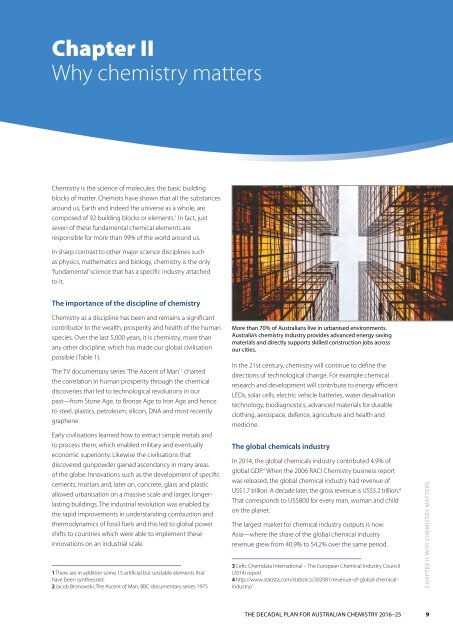Chemistry for a better life
1OiFLmD
1OiFLmD
Create successful ePaper yourself
Turn your PDF publications into a flip-book with our unique Google optimized e-Paper software.
Chapter II<br />
Why chemistry matters<br />
<strong>Chemistry</strong> is the science of molecules: the basic building<br />
blocks of matter. Chemists have shown that all the substances<br />
around us, Earth and indeed the universe as a whole, are<br />
composed of 92 building blocks or elements. 1 In fact, just<br />
seven of these fundamental chemical elements are<br />
responsible <strong>for</strong> more than 99% of the world around us.<br />
In sharp contrast to other major science disciplines such<br />
as physics, mathematics and biology, chemistry is the only<br />
‘fundamental’ science that has a specific industry attached<br />
to it.<br />
The importance of the discipline of chemistry<br />
<strong>Chemistry</strong> as a discipline has been and remains a significant<br />
contributor to the wealth, prosperity and health of the human<br />
species. Over the last 5,000 years, it is chemistry, more than<br />
any other discipline, which has made our global civilisation<br />
possible (Table 1).<br />
The TV documentary series ‘The Ascent of Man’ 2 charted<br />
the correlation in human prosperity through the chemical<br />
discoveries that led to technological revolutions in our<br />
past—from Stone Age, to Bronze Age to Iron Age and hence<br />
to steel, plastics, petroleum, silicon, DNA and most recently<br />
graphene.<br />
Early civilisations learned how to extract simple metals and<br />
to process them, which enabled military and eventually<br />
economic superiority. Likewise the civilisations that<br />
discovered gunpowder gained ascendancy in many areas<br />
of the globe. Innovations such as the development of specific<br />
cements, mortars and, later on, concrete, glass and plastic<br />
allowed urbanisation on a massive scale and larger, longerlasting<br />
buildings. The industrial revolution was enabled by<br />
the rapid improvements in understanding combustion and<br />
thermodynamics of fossil fuels and this led to global power<br />
shifts to countries which were able to implement these<br />
innovations on an industrial scale.<br />
1 There are in addition some 15 artificial but unstable elements that<br />
have been synthesised.<br />
2 Jacob Bronowski, The Ascent of Man, BBC documentary series 1975<br />
More than 70% of Australians live in urbanised environments.<br />
Australia’s chemistry industry provides advanced energy saving<br />
materials and directly supports skilled construction jobs across<br />
our cities.<br />
In the 21st century, chemistry will continue to define the<br />
directions of technological change. For example chemical<br />
research and development will contribute to energy efficient<br />
LEDs, solar cells, electric vehicle batteries, water desalination<br />
technology, biodiagnostics, advanced materials <strong>for</strong> durable<br />
clothing, aerospace, defence, agriculture and health and<br />
medicine.<br />
The global chemicals industry<br />
In 2014, the global chemicals industry contributed 4.9% of<br />
global GDP. 3 When the 2006 RACI <strong>Chemistry</strong> business report<br />
was released, the global chemical industry had revenue of<br />
US$1.7 trillion. A decade later, the gross revenue is US$5.2 trillion. 4<br />
That corresponds to US$800 <strong>for</strong> every man, woman and child<br />
on the planet.<br />
The largest market <strong>for</strong> chemical industry outputs is now<br />
Asia—where the share of the global chemical industry<br />
revenue grew from 40.9% to 54.2% over the same period.<br />
3 Cefic Chemdata International – The European Chemical Industry Council<br />
(2014) report<br />
4 http://www.statista.com/statistics/302081/revenue-of-global-chemicalindustry/<br />
Chapter II Why chemistry matters<br />
THE DECADAL PLAN FOR AUSTRALIAN CHEMISTRY 2016–25 9


